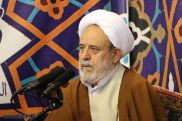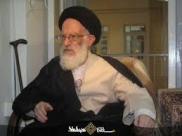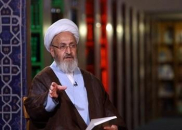





English
Is asking the rightful intercessors for intercession [shafā‘ah] tantamount to polytheism [shirk]?
![Is asking the rightful intercessors for intercession [shafā‘ah] tantamount to polytheism [shirk]? Is asking the rightful intercessors for intercession [shafā‘ah] tantamount to polytheism [shirk]?](https://erfan.ir/system/assets/imgs/NoImage.png)
Do the Shī‘ah believe in the taḥrīf [distortion] of the Qur’an?
![Do the Shī‘ah believe in the taḥrīf [distortion] of the Qur’an? Do the Shī‘ah believe in the taḥrīf [distortion] of the Qur’an?](https://erfan.ir/system/assets/imgs/NoImage.png)
Does Imam Mahdi (A.S) get depressed and shed tears because of the sins we commit?

Does the verse "فما استمتعتم به منهّن فاتوهن اجورهنّ فریضة" imply temporary marriage?

Late Ayatollah Bahjat has been quoted as having said: "The aged ones of this era will witness the moment of the reappearance of the Imam of Time (atf)." What is your opinion concerning this saying of the late Ayatollah?

Some relatives insult people's beliefs and sanctities, should we stop visiting them?

What is our duty during the time of Imam Mahdi’s occultation?

The Secrets of the Quran oaths

When it is Haram to ask a woman for marriage/the Grand Ayatollah Shobairi’s answer

The Grand Ayatollah Shobairi answered a question about when it is Haram to ask a woman for marriage.
Question: Is it allowed to ask a divorced woman for marriage when she is observing her Iddah (certain period of time a woman must observe after divorce before she can marry again)?
The Grand Ayatollah Shobairi: If she is in Iddah of revocable divorce, asking to marry her is Haram.
Are we allowed to attend the majalis (gatherings) of Imam Hussein (as) at the houses of those muslims who treat Imam Ali (as) as God?

During ziyārah, why do the Shī‘ah kiss the doors and walls of the shrine of awliyā’ and seek blessings [tabarruk] whereby?
![During ziyārah, why do the Shī‘ah kiss the doors and walls of the shrine of awliyā’ and seek blessings [tabarruk] whereby? During ziyārah, why do the Shī‘ah kiss the doors and walls of the shrine of awliyā’ and seek blessings [tabarruk] whereby?](https://erfan.ir/system/assets/imgs/NoImage.png)
The ruling about taking upper body clothes off in mourning ceremonies/the Grand Ayatollah Safi’s answers

Military training for women

Games

The range of the soil of Karbala/the Grand Ayatollah Makarem’s answer
For the Western audience: DOES GOD EXIST?

The use of weapons of mass destruction in disbelieving countries/the Grand Ayatollah Sobhani’s answer

Did Imam Al-Hussein have a daughter named “Ruqayyah” or “Sukainah” who passed away in Damascus while she was around 3-4 years old?

Some of the incidents pertaining to the event of Karbala do not seem to be rational? How can they be justified?

Is calling on someone tantamount to worshipping him and to polytheism?
